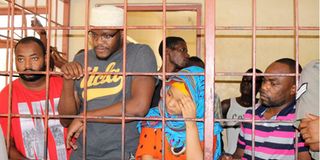
The self-proclaimed witchdoctor and herbalist failed to convince the Court of Appeal to allow him proceed to the country’s apex court in his fight to reclaim the money.
A self-proclaimed witchdoctor and herbalist has failed in his bid to escalate to the Supreme Court a fight for his assets and cash seized by the State over money laundering links eight years ago.
Mr Stephen Vicker Mangira, who claimed to be witchdoctor and that the Sh18.5 million that were seized in cash from him in 2017 was part of Sh50 million he had been paid by a client, failed to convince the Court of Appeal to allow him proceed to the country’s apex court as he fought to reclaim the money.
Other than the Sh18.5 million that were declared to be proceeds of crime, the court had also directed him to forfeit eight motor vehicles and Sh2.6 million in a bank account, to the Assets Recovery Agency (ARA).
Mr Mangira wanted to be allowed to move to the Supreme Court to challenge the declaration of the assets and cash, as proceeds of crime.

From left: Nabil Loo Mohamed, Bakari Kali Bakari, Lilian Benard Martin and Stephen Vicker Mangira when they appeared before Mombasa Senior Principal Magistrate Diana Mochache on charges of trafficking 540.88gms of Heroin valued at Sh1.62million.
His appeal against the High Court decision was dismissed by a bench of three judges of the appellate court in October last year.
In the latest decision, Justices Agnes Murgor, Dr Imaana Laibuta and Grace Ngenye-Macharia said Mr Mangira alongside Nabil Loo Mohamed and Ali Cars failed to demonstrate that their appeals raised issues of public importance, to be addressed by the Supreme Court.
“We find nothing to demonstrate that the applicants’ case raises matters of general public importance or interest, or that their case transcends their private interests in the movable assets and moneys sought to be forfeited pursuant to statute law,” the judges said.
ARA had opposed the case arguing that none of the issues raised by Mr Mangira were new or novel, deserving pronouncement by the Supreme Court.
“.. and having failed to show what in their intended appeal constitute points of law of general public importance that transcend their private litigation interests and, further, having failed to demonstrate how such interest have a bearing on the general public interest and concern with regard to specific elements, we reach the inescapable conclusion that their Motion fails and is hereby dismissed with costs to the respondent (ARA),” the judges said.
The money and cars were seized by state agency and the police in 2017 after he was arrested at a hotel in Mombasa over money laundering and drug trafficking claims.
The two were later charged alongside a Tanzanian with drug trafficking but they were acquitted four years later, with the court saying the prosecution failed to prove the case against them.
Mr Mangira had claimed that he had sold a parcel of land in Kericho, made some deposits and carried the Sh18.5 million in suitcases. He further claimed that he had been paid by a client Sh50 million for treatment.
Mr Mangira further claimed that he intended to purchase ab apartment and two hearses with the money, but the agency said he could not identify the apartment or the vehicles he intended to purchase, or produce any evidence relating to the alleged transactions.
The state agency submitted that Mr Mangira was a frequent traveler to Tanzania for unknown purposes and that there was reasonable cause to believe that they were part of an organised criminal enterprise.
While ordering the forfeiture of the money and cars to the State, High Court judge Njoki Mwangi said the inconsistences in the explanation given Mangira as to his source of his income validated the assertion by ARA as to the illegitimacy of the money and the assets.
“This Court cannot overlook the fact that at the outset, when questioned by the police, the 1st respondent (Mangira) stated that he had sold a piece of land at Kericho, which sale was ostensibly the source of the cash that he was found in possession of. Later after being acquitted in the criminal case, he filed a further replying affidavit. In the said affidavit, he averred that the amount of Sh18,500,000 was allegedly given to him by an Indian arising from the 1st respondent’s work as a witchdoctor and he was paid Sh55,000,000,” the judge had observed.





